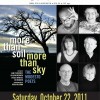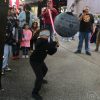Sam Pierstorff
By Chris Murphy
Words are so very powerful. They can hurt, they can heal, they can demean and they can elevate. I am in awe of people that can pull the depths of emotion up with simple words and phrases. I can easily get lost in the literary imagery of what I read, but sadly I have a short attention span and so things I love the most are works like Old Man and the Sea by Hemmingway, shorts stories, run-on stuff like Kerouac, and satirical and surgical Hunter Thompson and Poetry. I cried when the Memorial Hospital Tour opened because of the powerful words of local teacher and poet Sam Pierstorff. His words are magical and this year he takes the helm of the 12th Annual MAMA Awards where his words meet music and celebrate the rhythm of Modesto in many ways. Let’s meet Sam.
How did Sam Pierstorff come to be?
I was born in 1975 to a Syrian/Muslim mother and an American/military father from Kentucky.
Let’s face it: their divorce was imminent. I spent the next few years of my life living with one older brother, a tough-as-nails mother, and a parakeet named Tiki in Orange County, California. After moving to five homes in four cities over the next ten years, Ifinally went off to college in Long Beach where my life really began. I got hooked on a drug called “poetry” and spent the next few years studying, reading, writing, and falling in love with language. Eventually, I received my Master of Fine Arts degree, moved to Modesto to begin teaching at Modesto Junior College, and soon was honored as the city’s Poet Laureate, which made me the youngest ever appointed in the state. Though no longer the city’s official poet, I still host SLaM on RyE,Modesto’s monthly poetry slam; The ILL List, which I co-organize with Greg Edwards; and I run a small press, Quercus Review Press, through the college’s English department where we have recently embarked on our most ambitious poetry project to date: More Than Soil, MoreThan Sky: The Modesto Poets, a 252-page anthology that includes 51 Modesto poets and portraits of each by Doug Holcomb. It an amazing book that will be released on October 22nd (Amazon.com).
What is your favorite word?
If I actually did have a favorite word, I would probably have stopped writing years ago. I would just say that word over and over. For me, I think it’s the combination of words that makes them sing, and finding those playful combinations is the fun of writing, like “coal” and “train,” for example. Pretty bland words in isolation, but listen to what Michael Stillman does in his poem, “In Memoriam John Coltrane.” He writes, “listen to / these cars carry coal, listen / to the coal train roll.” Now we’re groovin’. Hear the alliteration of those consonant C sounds like the crunch of box cars connecting on the tracks, and of course, the play on “coal train” and “Coltrane.” Love it. It’s not the individual words that matter. It’s how we use them that makes all the difference.
What literature inspired you as a kid?
I didn’t read much as a kid. Ironic, I know. Other than some Encyclopedia Brown books, it wasn’t until college when I discovered Charles Bukowski that I began to learn about “voice,” and more importantly, that I had one too. Prior to that, as a kid, I was always outside skateboarding. Books were what I used to stiffen a wobbly launch ramp.
What things inspire you the most?
What if I told you I didn’t believe in inspiration? I think at best this concept is a myth for writers; at worst it’s an excuse that writers use to not write. I believe in perspiration, however. Whether you’re an artist, musician, or poet — the good ones do the work every day or damn near, and some days are better than others, but if we wait for inspiration to strike, we are waiting way too long between poems. If you’re asking me what topics I choose to write about, then that’s easier: family, kids, teachers, students, hookers, the girls with the missing door on her 1984 Toyota Corolla (working on that poem now). I write what I see, so I am always watching with eyes wide open. There is so much out there worth elevating to a poem, but people miss the good stuffbecause they’re looking at the obvious: sunsets, waterfalls, almond blossoms. Not me. Those things are already beautiful and don’t need a poem to capture their beauty. I like the gum wads on the sidewalk, or the baby with an eye patch, or that large red-headed girl driving down Briggsmore with no car door. Doesn’t she deserve a poem more?
When did you realize that you had and felt the rhythm of language?
When I was in high school, my senior-year English teacher asked me to read a short poem out loud about my parent’s divorce—something about hiding under their bed before it wasn’t their bed anymore. Halfway through, I broke down in class, sobbing, completely ambushed by my own poem (as poet LillianVallee would say). My teacher knelt down and whispered, “You’re a writer, Sam.” She didn’t try to console me. I had shared something real and powerful and it helped me as much as it helped others in the class, and that’s when I knew I had to keep writing—to help myself and to help others. Not sure if there was rhythm in that early poem, but my heart was certainly beating like a heavy metal drum solo, and I needed to write things down to steady the pace of myheart before it burst.
What is it about teaching that you love so much?
I like staying as young as possible. Students are good for that. They introduce me to new language and music and trends that I don’t normally subscribe to (and still wouldn’t, but it’s nice to be in the loop). And of course, there’s always the student whose life path changes before your very eyes. He comes to community college after a stint in Iraq or in prison (true story) and heads off two years later to Berkeley to pursue a degree in English because my poetry or English 101 class inspired him. When that light bulb goes on in a student’s mind and you know you had a small hand in shaping the life of a fellow human being, that’s as good as it gets for anyone.
What do you think the effect of Texting and Twitter has had on modern conversation?
I think brevity is essential in poetry, so I am all for short, precise communication, but texting has become such a problem in classes. Students can’t disconnect. It’s an addiction. Young people today (and I know that phrase makes me sound like your grandpa) can’t live in the moment, can’t be at peace without the intrusion of the outside world. Everything becomes so urgent because their iPhone is vibrating. There’s no peace, no patience. And with essay writing, there’s no development, no thoughtful, sustained argumentation. Texting and Twitter have created a world where depth and detail become irrelevant or rarely required. Most of what people know these days comes from bumper stickers and headlines. No one bothers to get the full story anymore.
Do you Haiku?
Yes, I do haiku.
In fact, my haiku is cool.
See, I just wrote one.
How do you like Modesto?
Modesto is slowly becoming awesome. You may be walking downtown, take a few wrong turns, and awesome may be the last thing on your mind, but you can also spend Friday night eating pizza at Concetta’s, and then have drinks at Tresetti’s with dear friends, and end up dancing at the Tiki, because why the hell not? Or you might pop over to an Off The Air show or a poetry slam or an open mic at the Queen Bean. You can do all that and love this town. Or you can skip it and complain about how much we suck. But here’s my theory: if your life sucks in Modesto, it will suck everywhere you go—because the fact is, you probably suck. A city doesn’t make a man cool. A man brings cool to the city. I try to bring cool things here (i.e. poetry slams) and so does Greg Edwards (i.e. Off The Air) and Chris Ricci (i.e. X-Fest) and Chris Murphy (i.e. MAMAs!) and so do many, many others. So Modesto is great. It really is. But a person has to believe that first. Then the city will reveal itself to him or her—one cool new thing at a time.
You wrote an amazing poem for the opening of Memorial Hospital. How do you take
something like a hospital opening and make it so personal?
I write poems one line at a time. I never pre-plan them. I just write a first line that leads to a second, and a third and so on. The poem naturally takes its turns, and Ifollow where the poem wants to go. It sounds silly, but that’s the truth. So as I recall writing that hospital poem, I remembered those big cranes that built the North Tower and my toddler’s reaction to them every time we drovepast. And that’s where I began the poem, and the rest just wrote itself. I know that poem is on a plaque inside the hospital somewhere because people tell me they’ve seen it, but I haven’t been sick enough to be admitted long enough to see it myself. I think I am gonna wait to reread that poem.
Your book, Growing Up In Someone Else’s Shoes, was amazing? Were there any stories that meant the most to you?
The title poem, “Growing Up In Someone Else’s Shoes,” may mean the most to me. It was a poem derived from a picture of me and my brother in thrift store clothes under a tree. We looked very dorky. I was stiff with anger and my brother was all smiles. It was a sad photo actually because I knew how angry I was as a kid growing up poor in a broken home, but my mom tried always to make us feel special. God bless her. I literally grew up in someone else’s shoes, and I still feel like that insecure kid sometimes. Second to that short poem, I have a few pieces about my own children. When you’re a dad, your kids mean everything to you, so any poems about my sons or daughter mean a great deal to me.
When did you first get involved with Poetry Slam?
I used to slam in Huntington Beach and Long Beach while in college (late 90s). I never tried to make a team or tour nationally. I just signed up for every slam open mic in the area. It was a blast. And it was always a great place to take a first date. So I did that for a while, and then when I came to Modesto, I wanted to bring that poetic energy with me, so I started the monthly slams at the Prospect Theater. We’ve been there with a full house on the 3rd Wednesday of every month for ten years now!
The Ill List is one of the most respected Poetry Slams in the USA. What makes it so special?
There is no underestimating the power and energy and enthusiasm of our great Modesto audience. They cheer so loud that poets all over the country can hear them. Poets call, and email, and message me all the time for a chance to compete here. We offer a healthy prize: $1500, and Greg Edwards and I go the extra mile in terms of hospitality, hotel, food, etc. We always keep the line-up fresh, highly prestigious, and very competitive. And of course, seeing Greg in a bra and mini-skirt may have something to do with our glowing national reputation.
What do you think about Modesto’s place in the history of American Graffiti?
I wish, like a lot of Modestans, that good ‘ol George Lucas would come through and publicly anoint this town with his light saber so the whole world knew the story of American Graffiti, but alas, that may never happen. So we definitely have to keep up with our amazing car shows and Graffiti summers to relive the lore of the 50s. I am happy to see the effort being made to establish Modesto’s American Graffiti history. I am all for it. I do, however, get insanely jealous when I see all the beautiful classic cars come through in the summer while my ’71 Chevy rots in my driveway. Someone please restore my truck!
Do you think that retro and the modern world can co-exist?
Totally. That’s the perfect blend these days in fashion, in entertainment, in life. Vintage is chic. my 9-year-old kid loves watching Star Wars at the very retro State Theater. Both the movie and the theater are way older than he is, but great things never die. That’s retro. It keeps coming back because it’s so damn cool.
Describe your perfect Modesto day.
That day is coming on October 22nd, 2011. It’s the day when the Modesto Poets anthology comes out on Amazon. It will be the day that everyone buys the book online and our sales rank climbs to #1 and the NY Times Book Review calls for an interview, and our town’s national reputation surges out of the dungeon of murder, meth, and auto theft, and into the light of literature.
If you had unlimited funds, what event or thing would you do to make Modesto an even more creative place?
I think Modesto needs a literary/book festival: A weekend of major authors from all genres doing readings, workshops, lectures. We have had a few great authors come through the college, one by one (i.e. Kay Ryan, David Sedaris, Frank Rich, Maya Angelou, et al.) But what if we had all of them at once for a whole weekend and we could workshop with them, listen to their stories, and draw inspiration from some of the country’s most renowned writers? We could start quite a revolution here . . . with the pen, not the sword.
The most important question of all… Beatles or Stones… Why?
Gotta go with the Beatles. Mick Jagger always creeps me out in those pants that are so tight it makes his lips inflate to twice their size.











